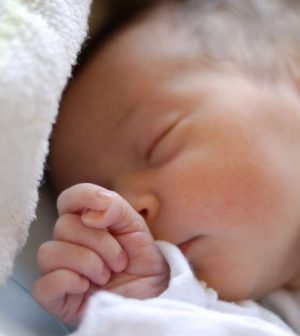- Could Your Grocery Store Meat Be Causing Recurring UTIs?
- Are You Making This Expensive Thermostat Error This Winter?
- Recognizing the Signs of Hypothyroidism
- 10 Strategies to Overcome Insomnia
- Could Artificial Sweeteners Be Aging the Brain Faster?
- Techniques for Soothing Your Nervous System
- Does the Water in Your House Smell Funny? Here’s Why
- Can a Daily Dose of Apple Cider Vinegar Actually Aid Weight Loss?
- 6 Health Beverages That Can Actually Spike Your Blood Sugar
- Treatment Options for Social Anxiety Disorder
Newborns’ Brains Aren’t ‘Undeveloped’ Compared to Those of Infant Monkeys, Chimps

New research challenges a long-held notion that human newborns enter the world with brains that are significantly less developed than those of other primates.
Babies are born extremely helpless and with poor muscle control, and human brains grow much larger and more complex than other species following birth, investigators said.
Because of those observations, it’s long been believed that human newborns have brains comparatively less developed than other primates at birth.
But that’s a false impression, researchers report in the Dec. 4 issue of the journal Nature Ecology & Evolution.
Analysis of brain development patterns in 140 different mammal species has provided new insight into the evolution of human brains, by taking into account factors like fetal gestation and comparative brain size of newborns to adults.
“This new work changes the overall understanding around the evolution of human brain development,” said lead researcher Aida Gomez-Robles, an associate professor of anthropology at University College London.
“Humans seem so much more helpless when they’re young compared to other primates, not because their brains are comparatively underdeveloped but because they still have much further to go,” Gomez-Robles added in a university news release.
Scientists typically judge brain development of different species by comparing the size of their brains as newborns to their brain size as adults, researchers said in background notes.
Humans are born with a brain that’s relatively smaller than its adult size compared to other primates, making it seem they’re less developed, researchers said.
This was thought to be the result of an evolutionary compromise, so babies’ heads could fit through the mother’s birth canal and then develop more outside the womb.
It also was thought this underdevelopment at birth encouraged greater brain plasticity, fueling the development of human intelligence by making babies’ brains more malleable and more easily affected by the environment around them.
However, the new research has shown that it’s a misleading notion, because other measurements of human brain development show that humans at birth are largely in line with chimpanzees, bonobos, gorillas and orangutans.
Primates — including humans — are relatively consistent with each other when it comes to brain development at birth and length of gestation, despite major variations between primates and other mammal species, results show.
And while human brains do take longer than other species to grow to full capacity, that’s because they grow so much more later in life — not because they’re significantly less developed at birth, researchers said.
More information
The U.S. Centers for Disease Control and Prevention have more about early brain development.
SOURCE: University College London, news release, Dec. 4, 2023
Source: HealthDay
Copyright © 2026 HealthDay. All rights reserved.










